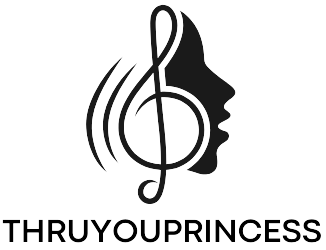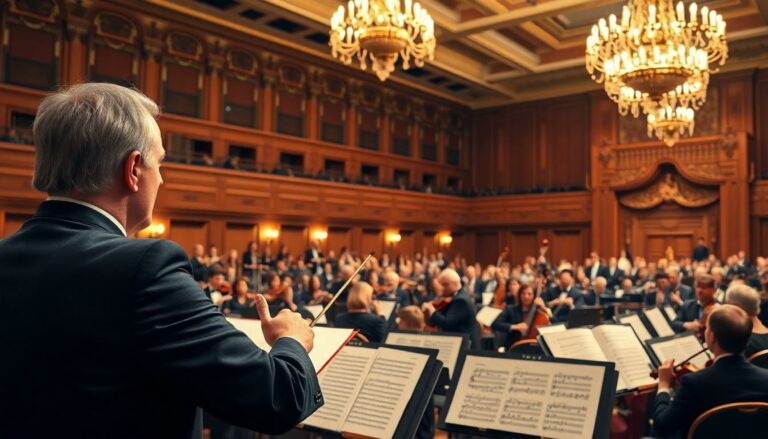Table of Contents
ToggleSeptember isn’t just the month when summer waves goodbye; it’s also Classical Music Month, a time to celebrate the symphonic sounds that have shaped cultures and sparked creativity for centuries. Whether you’re a seasoned aficionado or someone who thinks Beethoven is just a fancy name for a dog, this month invites everyone to dive into the rich world of orchestras, sonatas, and maybe even a little dramatic flair.
Imagine transforming your mundane commute into a majestic journey through time, where every traffic light becomes a crescendo and every honking horn morphs into a string quartet. This month, let’s embrace the elegance of classical music and discover how it can elevate everyday moments. So, dust off that old vinyl or stream a symphony, because who knows? You might just find your new favorite soundtrack to life’s adventures.
Overview Of Classical Music Month
September serves as Classical Music Month, dedicated to celebrating the rich history and impact of classical music. This month invites individuals to reconnect with the genre, regardless of their prior experience. Various events across the country highlight live performances, educational programs, and discussions that feature renowned composers and musicians.
Listeners can explore diverse styles, ranging from Baroque to contemporary, as orchestras showcase their talents. Engaging with classical music offers an opportunity to appreciate intricate compositions and emotive performances. Many organizations provide resources and recommendations, making the genre accessible to everyone.
The focus remains on fostering appreciation for timeless works and introducing new audiences to the beauty of orchestral sounds. Community events often feature local musicians, creating a platform for emerging talents to shine. In addition, streaming services frequently curate playlists that spotlight classical masterpieces, helping listeners discover their next favorite piece.
Activities during Classical Music Month encourage exploration, whether attending a concert, participating in a workshop, or simply enjoying music at home. Engaging with different interpretations of classical works enriches the listening experience and broadens understanding. Families can embark on this musical journey together, creating lasting memories through shared experiences with symphonies and sonatas.
Throughout September, individuals can unleash creativity and inspiration while immersing themselves in the enchanting world of classical music.
Significance Of Classical Music Month

Classical Music Month holds immense value in fostering appreciation for this timeless genre. The significance extends to various aspects of society and personal growth.
Cultural Impact
Classical music influences cultures worldwide. Societies often reflect their history through musical compositions, showcasing experiences and emotions. Notable composers like Beethoven and Mozart contributed pieces that continue to resonate, shaping musical traditions. Festivals and concerts celebrate diverse styles, engaging audiences in a shared appreciation. Public performances can unite people, creating opportunities for cultural exchange. Community outreach programs often highlight local musicians. These initiatives aim to enhance public awareness of classical music’s relevance today.
Educational Opportunities
Educational programs play a crucial role in Classical Music Month. Schools may organize classes to introduce students to music theory and appreciation. Workshops often connect aspiring musicians with professionals, fostering skills development. Online courses provide accessibility to those interested in learning at their own pace. Organizations frequently host lectures that delve into composer backgrounds and historical contexts. Engagements with orchestras provide firsthand experiences, enhancing understanding of orchestral instruments and performances. Through these opportunities, individuals can cultivate a deeper connection to classical music while benefiting from its educational aspects.
Celebrating Classical Music Month
September offers an excellent opportunity to embrace the beauty of classical music. Numerous events and activities take place, highlighting the genre’s rich history and cultural significance.
Concerts And Events
Festivals and concerts showcase local talent while inviting renowned artists to perform. Attendees experience a range of styles, from Baroque to contemporary compositions. Community events allow families to bond while enjoying live performances together. Workshops often accompany these gatherings, providing insights into composers’ techniques and orchestral workings. Engaging with musicians fosters a deeper appreciation of various classical genres. Participation in these events enriches the overall experience, making music accessible and enjoyable for everyone.
Online Resources And Streaming
Numerous online platforms offer curated playlists featuring classical masterpieces for easy access. Streaming services allow listeners to explore a vast array of recordings, perfect for those unable to attend live events. Educational resources, like virtual lectures and interactive workshops, enhance understanding of classical music theory. Platforms also connect aspiring musicians with industry professionals through online mentorship. Engaging with these resources empowers individuals to immerse themselves in classical music at their convenience, facilitating both learning and enjoyment.
Benefits Of Engaging With Classical Music
Engagement with classical music offers numerous benefits, enriching both cognitive abilities and emotional well-being.
Cognitive Development
Listening to classical music stimulates brain activity, enhancing concentration and memory function. Research shows that regular exposure can improve spatial-temporal skills, a vital aspect for subjects like math and science. Additionally, engaging with complex compositions requires analysis and critical thinking, fostering problem-solving abilities. Musicians often experience heightened brain connectivity, allowing them to process information more efficiently. Moreover, children who participate in music education show significant improvements in academic performance compared to their non-musical peers. Integrating classical music into daily routines supports mental agility and cognitive growth across various age groups.
Emotional Well-Being
Classical music contributes substantially to emotional health, serving as a powerful tool for stress reduction. Listening to calming compositions can lower heart rates and promote relaxation, providing relief from anxiety and tension. Exposure to uplifting symphonies inspires positive moods and elevates overall well-being. Research indicates that individuals who engage with music often experience greater emotional resilience, helping them cope with life’s challenges. In therapeutic settings, classical music aids in processing emotions, facilitating healing and introspection. Regular interaction with classical music nurtures emotional intelligence, helping individuals develop a deeper understanding of their feelings and those of others.
Classical Music Month offers a unique opportunity to dive into the rich tapestry of orchestral sounds and timeless compositions. Engaging with this genre can transform everyday experiences into moments of beauty and inspiration. As listeners explore various styles and attend local events, they not only celebrate the past but also connect with the present.
The month serves as a reminder of classical music’s profound impact on culture and personal growth. By participating in concerts, workshops, and educational programs, individuals can deepen their appreciation and understanding of this art form. Embracing classical music can enrich lives, fostering creativity and emotional well-being.



